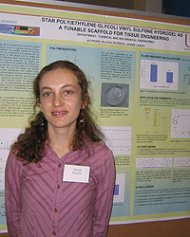 Q. How can I apply for graduate work in your department?
Q. How can I apply for graduate work in your department?
A. Details are provided on our Apply page. Briefly, you need to submit an for admission to the Graduate School along with a fee (check application for current fee), official transcripts from all colleges and universities attended and three letters of recommendation from faculty members (preferably) or other persons who can discuss your potential for graduate work in chemical engineering. You also need to submit GRE Aptitude test scores. If you are not a citizen or permanent resident of the U.S., you will need to submit a TOEFL score. Official copies of these documents are required for admission. However, photocopies can be used for the initial review process. A “statement of academic goals and research interests” is included with the application, and is beneficial to the admissions committee in reaching its decision. Publications in peer reviewed journals are viewed favorably by the admission committee and submission of reprints is encouraged.
Visit for more information.
Q. What’s the difference between the two graduate programs in your department?
A. We have two very different graduate programs in our department:
— Chemical & Biochemical Engineering (CBE)
— Environmental Engineering & Water Resources (EE)
These two programs arose from the two original departments that merged to form our current department. Research in the CBE program is focused on biochemical and biomedical engineering while reseach in the EE program is focused on water resources. Details related to each program can be found in the graduate student handbooks.
Q. I cannot afford to pay the application fee now. Can I defer the fee until I am admitted?
A. We have a fee-free application process for students meeting certain criteria. Details are provided on our Apply page. If students do not meet these criteria, the application fee cannot be deferred or waived. It is the policy of the Graduate School that the fee be received along with all other required documents before that application is evaluated. Applications requiring a fee, but received without the fee, will be returned. All money orders and/or checks should be made payable to UMBC and should indicate your name, address and social security number.
Q. I have a non-chemical engineering undergraduate degree. What do I need in order to work toward an advanced degree in chemical engineering?
A. It will almost certainly be necessary for you to take a number of undergraduate engineering courses in addition to the courses required for the M.S. or Ph.D. degrees. Chemistry and physics majors will need approximately four additional undergraduate courses. Mathematics and biology majors will typically need more than four additional courses. However, each case is handled individually. Below is more detailed information:
You need to take undergraduate classes that will prepare you for our graduate core curriculum. Our graduate core curriculum consists of:
- ENCH 610 Chemical Engineering Thermodynamics
- ENCH 630 Transport Phenomena
- ENCH 640 Advanced Chemical Reaction Kinetics
- CHEM 437 Comprehensive Biochemistry I (only a requirement for the PhD)
- MATH 404G Introduction to Partial Differential Equations: Graduate Section







